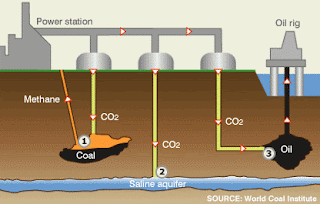Healthy skepticism
 "Clean energy" is in and everyone seems to want to jump on the bandwagon -- including a number of "dirty" technologies looking for ways to come clean. Those "ways" sometimes involve developing new technologies. In some cases it results in trying to stretch the definition of "clean energy". Oftentimes both strategies are employed.
"Clean energy" is in and everyone seems to want to jump on the bandwagon -- including a number of "dirty" technologies looking for ways to come clean. Those "ways" sometimes involve developing new technologies. In some cases it results in trying to stretch the definition of "clean energy". Oftentimes both strategies are employed.Consumers in EU are becoming increasingly wary of these tactics and they're letting their elected officials know how they feel. (GW)
Over two-thirds of respondents to the Commission's public consultation on an EU Strategic Energy Technology Plan are skeptical about the likely contribution of so-called clean fossil fuels, notably carbon storage, to the fight against climate change.
Background:
Among the most promising technologies being considered by the Commission in the fight against climate change are carbon capture and storage (CCS) technologies, which can sequester CO2 produced by coal-fired power plants and store it underground (see our LinksDossier).
The Commission, which is due to publish a separate communication on CCS on 20 November, wants to see 12 CCS projects up and running by 2015, and says that all coal plants in the EU should use CCS technologies by 2020.
Issues:
On 19 September, the Commission released the results of its public consultation on the SET Plan.
Only one-third (26%) of respondents considered clean coal and other fossil fuel technologies to be the best means for reducing CO2 emissions in the EU by 20% by 2020, while two-thirds of respondents favoured energy efficiency improvements in transport and buildings.
The potential of clean coal and other technologies for reducing global CO2 emissions will likely play a central role in the upcoming UN negotiations in December, due to take place in Bali and concerning a global framework for fighting climate change after the expiry of the Kyoto Protocol in 2012.
Australia and the US, the only developed nations that did not ratify the Kyoto protocol, are pushing for the promotion of CCS and other clean fossil fuel technologies as an alternative to binding emissions targets on individual nations.
While the EU is favourable to such technologies, its position on binding emissions targets is diametrically opposed to the American and Australian proposals. With or without clean technologies, the EU wants to see the introduction of a global CO2 emissions reductions scheme akin to the Kyoto Protocol.
The differing approaches have cast doubt on whether the world's major polluters can hammer out a solid agreement in Bali.
Positions:
According to one energy industry source in Brussels, the cabinet of EU Energy Commissioner Andris Piebalgs is struggling to get guarantees from member states and energy companies to commit funds for the realisation of 12 carbon sequestration demonstration projects by 2015.
But "there is no reason to give up hope yet. We are in the midst of a political battle (in Brussels) about this", says Arve Thorvik of the Norwegian oil and gas firm Statoil, which was the first to develop a CCS project in cooperation with Shell. Thorvik also told EurActiv that there are "no remaining technological barriers" to the development of further CCS projects.
The "show stopper" is cost, Thorvik said. Without strong financial backing from EU funds, an "opening" of state aid rules, and/or a robust carbon trading quota system with correct CO2 prices (a reference to the EU Emissions Trading Scheme) to support further CCS projects, Thorvik believes that there is "no way" the EU can reach its CO2 emission reduction target of 20% by 2020.
Latest & next steps:
- 20 Nov 2007: Commission expected to issue communication on CCS (technology section prepared by DG Environment) as part of a larger package on financing (prepared by DG TREN) and state aid rules (prepared by DG Competition);
- End 2007: Commission to finalise proposal for a Strategic Energy Technology Plan (SET-Plan);
- March 2008: Commission hopes for endorsement of the SET-Plan during the Spring Summit of EU leaders;
- By 2015: 12 large-scale demonstration projects to be launched for coal and gas-fired power plants;
- By 2020: all new coal-fired plants should include CCS technology and existing plants to be 'retrofitted' accordingly.

0 Comments:
Post a Comment
<< Home